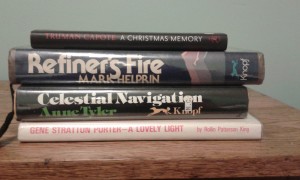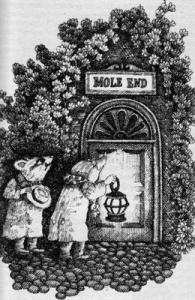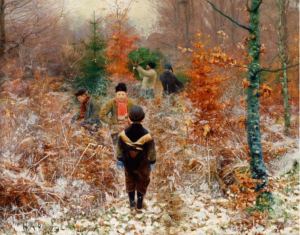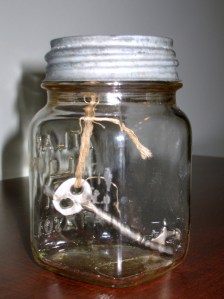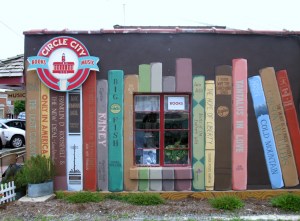
Rosemary had invited a few friends over for an afternoon party, and asked that they dress in the style of the Roaring Twenties. The guests had all arrived together, and after admiring each other’s costumes became restive.
“What’s the entertainment, Rosemary?” Cecil asked. He wore a straw boater and a pink bow tie with his old seersucker suit. He hadn’t worn that suit since graduating from seminary, and the jacket felt tight across the shoulders. “I don’t see a jazz quartet, and I haven’t been offered a martini.”
Rosemary explained, “I always wait for the longest day of the year and then miss it, so this year I decided to have a little garden party on the first day of summer, to mark it properly. And you’re just going to love the entertainment, Cecil. We’re going to read The Great Gatsby out loud, in parts! Clyde, you’ll be Gatsby, Howie can be Nick, Franklin is Tom, I’ll be Daisy, Dana can be Jordan Baker, and Lizzie is Myrtle Wilson.”
The guests shifted uneasily. Lizzie looked irritated.
“Anyway, you left me out,” Cecil observed.
Rosemary closed her eyes to think. “You can be Wilson,” she said slowly. She held out a hand, imploring. “I read Gatsby every spring, and I woke up one morning not too long ago and said to myself, ‘Oh! I’ve forgotten to read Gatsby!’ Haven’t you ever done that? So that’s why I invited you all here, on the longest day of the year. Now, follow me down to the pond.”
“It’s sure going to feel like the longest day of the year,” Frank murmured in Dana’s ear.
Rosemary led the party down to the pond behind her house, a pond that once served to water a field of cattle. It had since been domesticated. The field was planted with bluegrass and flower beds to set off Rosemary’s two-story yellow brick Colonial with its emerald front door and matching shutters.
The back lawn, shining green and flawless, ran in a smooth green ribbon that rippled around mosaic birdbaths and gravel paths before circling the pond. Pools of bright flowers clustered around the water on the far side, and on the near side was a casual scatter of Adirondack chairs, ingeniously designed of wood-grained plastic. A long table nearby was covered with a white cloth that swept the grass and blew gently when the wind stirred. It held a silver punch bowl the size of a baby’s bath, an equally large silver epergne filled with blue hydrangeas, a tall white cake under a glass dome, covered platters of hors d’oeuvres, fruit, and a scattering of clear glass punch cups, napkins, and china plates.
Rosemary turned when she reached the pond and opened her mouth to speak when a cry of alarm, followed by loud laughter, stopped her.
“Dana broke her face!” Lizzie announced.
“What?”
“Her heel snapped off, right in the lawn. I wish you’d seen! Her face twisted into the awfullest knot as she caught herself! Frank can’t stop laughing.”
Frank was doubled over.
Lizzie said, “She might have broken every bone in her face. Is your face all right, Dana?”
Dana, disgruntled, kicked off both shoes and smoothed her white linen dropped-waist dress. She’d ordered it from J. Peterman, and fear of smearing it on the grass had helped keep her upright. Dana had thought herself the essence of the Jazz Age until she saw Rosemary, in her silver beaded dress with the matching head band.
The party assembled near the table by the pond.
“Let’s go fishing,” Lizzie said. “Got any poles?”
“No. Anyway, we’re going to read Gatsby.”
“Who’s that?” Dana gestured across the lawn, to the sloping yard that ended in a bed of pink and yellow flowers, across to a rougher yard in front of a small dusty house. Two little girls presided over a table of glassware, toys, and household items. “A mad tea party?”
“That’s Nick’s place!” Rosemary said happily. “Isn’t it perfect that I have a little shack next to my place, like Gatsby had next to his? I should have sent a guy over to mow the lawn before my party.”
“They’re selling things,” Lizzie said. “It appears to be a yard sale. I wonder if they have a fishing pole for sale?” She drifted across the lawn, stepped through the flower bed, and walked up the slope toward the girls.
“It’s a perpetual yard sale,” Rosemary told Cecil. “Those people are out there all the time. I can’t imagine what they’re peddling.” She sank into one of the plastic chairs and waved her copy of The Great Gatsby toward the chair beside hers. He sat.
Dana followed Lizzie, but stopped at the flower bed rather than walk across it with bare feet. “These are some unusual flowers,” she called. “What are they, Rose?”
Rosemary sighed, and let her book fall to the grass beside her chair. “Anyway,” Cecil said, patting her arm, “you only have one copy of the book. We can hardly read parts with only one copy.”
Rosemary stood and walked to the flower bed, with Cecil behind her. Frank, Howie, and Clyde were pouring themselves drinks and sampling the hors d’oeuvres.
Rosemary and Cecil surveyed the flower bed with Dana. “They look like teacups!” Dana said. She had a smidge of red lip gloss a bit to the east of her mouth.
“Those are my teacup tulips,” Rosemary explained. “They aren’t really tulips, of course—after all it’s June, right? They are a hybrid lily, but I call them my teacup tulips. Aren’t they darling?”
Each lily had a rounded, scallop-edged cup, yellow with deep pink striping, and one petal on each curled around sharply like a handle on a teacup.
Rosemary allowed them a moment to enjoy the novelty lilies. “Now come along, both of you, and let’s read Gatsby. We’ll pass the book and read it in chunks.”
“Hey!” Frank said, “These chicken livers are delicious. Are they bad or good for cholesterol?”
“Save me some of those livers for bait,” Lizzie said. She descended the slope, stepped through the flower bed, and walked over to show off her acquisition—a pink plastic Barbie fishing pole. “This wasn’t up for sale, but I gave the kids $2 to rent it. Now be a pal, Frank, and thread one of those livers on that hook. It’s okay to put the bacon on, too. Oh, and I told the kids they should come over and have a piece of cake.”
“Thank you,” Rosemary said. She did not sound grateful.
Everyone sat and watched as Lizzie made a tentative cast into the pond. “Aren’t there any fish?” she asked. “Look how the chicken liver and bacon made a greasy spot on the surface. What fish could resist that?”
“Come sit, Lizzie,” Rosemary said. “We’re about to start reading, and we need you. There aren’t any fish. Let’s read, and we’ll skip all the gray, ashy parts. We don’t need the Wilsons, really, do we? Or the trips into the city? We’ll just read the parts about the parties, and the music, and the moonlight.”
“Can’t stop now,” Lizzie said. “I’ve invested two bucks in this fishing pole, and I’m determined to catch a fish, if this pond will produce one.”
To distract her from Gatsby, Rosemary’s guests brought her plates of food, and three cups of champagne punch from the silver bowl. Howie and Dana walked across to invite the yard sale girls to come have some treats. They came, blonde and freckled and solemn, accepted plates filled with the white cake, and disappeared.
“I suppose I’ll have to go over there and buy my plates back,” Rosemary said.
“Hush, they’ll hear you,” Howie scolded. “Do you think they’re deaf?”
Rosemary stretched her legs out in front of her and crossed them at the ankle. “All right, Howie. You just go over there and get my plates back. Give them however much money they want, because those are my granny’s china pattern.”
Howie made binoculars of his hands and trained them on the yard sale table. “They’ve disappeared. No! There they are. They’re on the other side of the yard.”
“What happened to the sun? Wasn’t there a sun shining a minute ago?” Rosemary felt that her entire party was slipping away from her. She had meant for it to be so nice.
“It’s behind a cloud,” Cecil said. He pushed the copy of Gatsby beneath Rosemary’s chair with his foot and handed her a cup of punch.
“We’ll have to make our own sunshine!” Rosemary stood and took a deep swallow from the cup in her left hand. The drink made her close her eyes and throw her head backwards.
Cecil steadied her by placing his hand on her spine. Her dress felt like a damp silver cobweb, with hard knots of beading caught up in the threads. He wondered if it would break and pull away like cobweb when he removed his hand.
“I think the clouds are here to stay, but anyway, how would you make sunshine?”
“Don’t know yet. Why is Frank eating the hydrangeas? I thought he liked the livers.”
“Too much cholesterol, and he thinks the hydrangeas look like raspberry snow cones.”
Rosemary shook her head. “He mustn’t eat the flowers. Did you hear that Dana broke her face?”
“I did hear that. Her face looks fine now. See? She’s drinking champagne punch from one of your teacup tulips.”
“We mustn’t eat and drink the flowers. That’s not what they’re for. Let’s go get some breakfast.”
“You’ve just polished off a plate of cake. Anyway, it’s only five o’clock. And it’s the longest day of the year, so you want to see it out to the end, don’t you? What do you want breakfast for?”
“Here they come!” Howie announced. “And I think they’re bringing your granny’s plates back, so you should beg their pardon.”
The girls carried their plates and placed them on the table. “Thank you for the cake,” the oldest child, who was possibly nine or ten years old, said. She patted her smaller sister on the back encouragingly.
“Thank you,” the sister whispered. She had tiny front teeth, like pearl beads. She raised her eyes, a pale gray-blue, to look at Rosemary in her silver dress. “It’s a beautiful birthday party.”
“You’re welcome,” Rosemary said. “Only it’s not a birthday.”
The smaller sister held up a cloudy silver bud vase from the yard sale table. It held two blooms of Queen Anne’s Lace.
“Are these for Miss Rosemary?” Howie asked. “Isn’t that lovely? Let’s set them right here, beside the cake. Aren’t they wonderful, Rosemary?”
“Yes.”
Lizzie came up from the pond and handed the Barbie fishing pole to the older sister. “Thanks for letting me borrow it,” she said. “I didn’t get a single bite.”
The girls took the fishing pole and ran home, leaping over the teacup tulips like yearlings.
“Wasn’t that nice?” Dana said. “What sweetie pies. What are their names?”
“Let’s skip the gray and ashy parts,” Rosemary said, waving her hand. “Let’s get some breakfast. I love breakfast.”
Cecil rolled his eyes. “Rosemary, what is it with breakfast?”
“It’s the most important meal of the day. I feel like having a toastel struder.”
“We’ll get you a struder, my sweet. We’ll get you several struder. What’s the matter? Is your face broken?”
Rosemary considered this carefully. “I believe it is,” she said sadly, and she pressed one of her white hands with its brilliant silver nails, hard and shining as ice, to her cheek.
END
Read Full Post »
